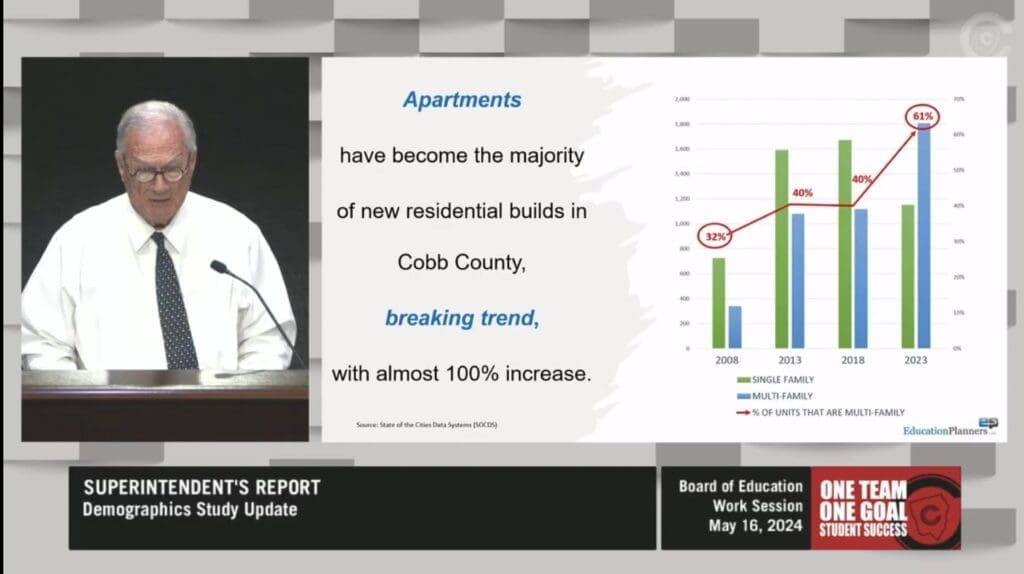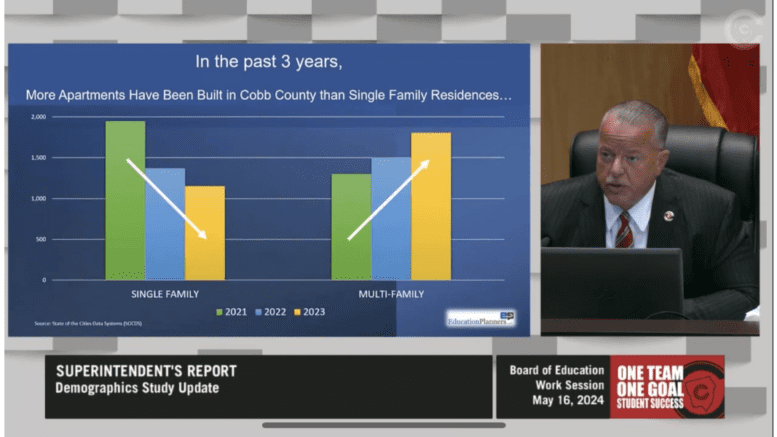By Rebecca Gaunt
At Thursday’s work session, Superintendent Chris Ragsdale called for anyone concerned about the quality of education in Cobb to take note of rising multi-family unit developments in the county.
He used his frequent example of Osborne High School, citing its “abysmal” graduation rate which is in the 70s.
“When you take into account all the students who stay all four years at Osborne HIgh School, the graduation rate is about 94%,” he said.
Ragsdale blamed transiency for the low graduation rate provided by the state.
“Transiency is brought about because of apartments and families taking advantage of apartments which might offer the first month’s free rent,” he said.
Post 3 board member Leroy Tre’ Hutchins said that modern apartments are often built in more of a condominium-style and Nichelle Davis pointed to the popularity of townhomes, both of which are considered multi-family.
Ragsdale said McEachern High School has never had apartments in its attendance zone and is about to have over 550.
“That is not positive. That is not the kind of residential growth you want to see,” he said.
Ragsdale added that it increases the stress on taxpayers in single-family residences.
The conversation took place as part of Education Planners CEO James Wilson’s demographics update for the Cobb County school board. It forecasted a population of 831,000 by 2030, and 934,500 by 2050, from the Governor’s Office of Planning & Budget. The Atlanta Regional Commission (ARC) recently adjusted its 2050 projection to 914,000. Cobb will remain the third largest county behind Fulton and Gwinnett.
The population of children ages 0-9 in Cobb is projected to grow from 91,686 in 2025 to 101,947 in 2035.
“This is an indicator or a trend that we are still a growing district,” Wilson said. “Ten years later you will see that this county is continuing to house larger families and many students.”

Wilson displayed a slide that showed 11 nearby counties, including Cobb, and the breakdown of building permits for single family vs. multi-family. In 2022, Cobb had the third most residential permits, with 52% issued for multi-family housing. In three years, more apartments have been built in Cobb County than single-family residences, a trend Ragsdale called a problem.
A breakdown of Cobb showed that Acworth, Austell, and Smyrna only issued permits for single-family dwellings in 2022 and 2023. Powder Springs issued a total of 226 single-family permits and 609 multi-family permits over the two year period. Unincorporated Cobb came in at 1,215 single-family permits over the two years, and 1,260 multi-family units.
Kennesaw issued the highest number of multi-family permits at 1,437, as well 291 single-family permits.
Board member Becky Sayler responded that transiency isn’t necessarily caused by multi-family housing, but by economic hardship. She stressed the importance of trying to reach kids from all backgrounds.
“We prefer to use the term mobility. And you’re right. We look at mobility for a lot of reasons,” Wilson said.
Wilson explained that his company tracks developments from the time of project approval until people start moving in to figure out immediate needs, such as portable classrooms.
The senior class of 2025 is projected to be the largest graduating class in district history, but the number of students in elementary school has declined since the pandemic.
In planning for Cobb’s needs, the numbers do not always match with state criteria. School capacity information is not always accurate due to the state not accounting for classrooms not being used for standard size classes. Some special needs classrooms have a smaller number of students based on individual needs, but state criteria does not take that into consideration. Board member David Chastain also pointed out that some classrooms are being used as sensory rooms to provide a break for students on the autism spectrum.
A school might be listed as under capacity, but there are mobile units on campus. The issue is exacerbated by the fact that Cobb exceeds state requirements for classroom size, according to Ragsdale.
It also raises questions when parents request a different school from their home school under House Bill 251 allowing school choice, and are told there’s no space, yet state data paints the school otherwise.
Hutchins pointed out that many apartments being built currently are classified as higher-cost luxury apartments with only one or two bedrooms, not intended for families.
Ragsdale disagreed with that assessment, saying that is often the pitch for new builds, but doesn’t always play out long term.
Hutchins posed the question of whether the district needs to reimagine its thought process on planning for schools, as land is becoming scarce and vertical building more common.
Wilson responded that the Sprayberry High School rebuild on Sandy Plains Road will be four stories.
The information presented will be used to guide the projects included in SPLOST VII.
View the work session presentation in full on the Cobb County School District website.

Rebecca Gaunt earned a degree in journalism from the University of Georgia and a master’s degree in education from Oglethorpe University. After teaching elementary school for several years, she returned to writing. She lives in Marietta with her husband, son, two cats, and a dog. In her spare time, she loves to read, binge Netflix and travel.
